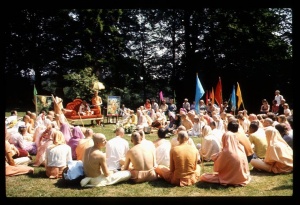SB 10.10.12: Difference between revisions
m (1 revision(s)) |
(Vanibot #0018 edit: make synonym terms in Sanskrit italic in SB - Vanisource) |
||
| Line 1: | Line 1: | ||
{{info | {{info | ||
|speaker= | |speaker=Nārada Muni | ||
|listener= | |listener=Nalakūvara and Maṇigrīva | ||
}} | }} | ||
[[Category:Srimad-Bhagavatam - Canto 10 Chapter 10]] | |||
[[Category:Bhagavatam Verses Spoken by Narada Muni - Vanisource|101012]] | |||
<div style="float:left">'''[[Srimad-Bhagavatam]] - [[SB 10|Tenth Canto]] - [[SB 10.10: Deliverance of the Yamala-arjuna Trees|Chapter 10: Deliverance of the Yamala-arjuna Trees]]'''</div> | |||
<div style="float:right">[[File:Go-previous.png|link=SB 10.10.11]] '''[[SB 10.10.11]] - [[SB 10.10.13]]''' [[File:Go-next.png|link=SB 10.10.13]]</div> | |||
{{RandomImage}} | |||
==== TEXT 12 ==== | ==== TEXT 12 ==== | ||
<div | <div class="verse"> | ||
evaṁ sādhāraṇaṁ deham | :evaṁ sādhāraṇaṁ deham | ||
avyakta-prabhavāpyayam | :avyakta-prabhavāpyayam | ||
ko vidvān ātmasāt kṛtvā | :ko vidvān ātmasāt kṛtvā | ||
hanti jantūn ṛte 'sataḥ | :hanti jantūn ṛte 'sataḥ | ||
</div> | </div> | ||
| Line 17: | Line 22: | ||
==== SYNONYMS ==== | ==== SYNONYMS ==== | ||
<div | <div class="synonyms"> | ||
''evam''—in this way; ''sādhāraṇam''—common property; ''deham''—the body; ''avyakta''—from unmanifested nature; ''prabhava''—manifested in that way; ''apyayam''—and again merged with the unmanifested ("for dust thou art, and unto dust shalt thou return"); ''kaḥ''—who is that person; ''vidvān''—one who is actually in knowledge; ''ātmasāt kṛtvā''—claiming as his own; ''hanti''—kills; ''jantūn''—poor animals; ''ṛte''—except; ''asataḥ''—rascals who have no knowledge, no clear understanding. | |||
</div> | </div> | ||
| Line 24: | Line 29: | ||
==== TRANSLATION ==== | ==== TRANSLATION ==== | ||
<div | <div class="translation"> | ||
This body, after all, is produced by the unmanifested nature and again annihilated and merged in the natural elements. Therefore, it is the common property of everyone. Under the circumstances, who but a rascal claims this property as his own and while maintaining it commits such sinful activities as killing animals just to satisfy his whims? Unless one is a rascal, one cannot commit such sinful activities. | This body, after all, is produced by the unmanifested nature and again annihilated and merged in the natural elements. Therefore, it is the common property of everyone. Under the circumstances, who but a rascal claims this property as his own and while maintaining it commits such sinful activities as killing animals just to satisfy his whims? Unless one is a rascal, one cannot commit such sinful activities. | ||
</div> | </div> | ||
| Line 31: | Line 36: | ||
==== PURPORT ==== | ==== PURPORT ==== | ||
<div | <div class="purport"> | ||
Atheists do not believe in the existence of the soul. Nonetheless, unless one is very cruel, why should one kill animals unnecessarily? The body is a manifestation of a combination of matter. In the beginning it was nothing, but by a combination of matter it has come into existence. Then again, when the combination is dismantled, the body will no longer exist. In the beginning it was nothing, and in the end it will be nothing. Why then should one commit sinful activities when it is manifested? It is not possible for anyone to do this unless he is rascal number one. | Atheists do not believe in the existence of the soul. Nonetheless, unless one is very cruel, why should one kill animals unnecessarily? The body is a manifestation of a combination of matter. In the beginning it was nothing, but by a combination of matter it has come into existence. Then again, when the combination is dismantled, the body will no longer exist. In the beginning it was nothing, and in the end it will be nothing. Why then should one commit sinful activities when it is manifested? It is not possible for anyone to do this unless he is rascal number one. | ||
</div> | </div> | ||
__NOTOC__ | |||
<div style="float:right; clear:both;">[[File:Go-previous.png|link=SB 10.10.11]] '''[[SB 10.10.11]] - [[SB 10.10.13]]''' [[File:Go-next.png|link=SB 10.10.13]]</div> | |||
__NOTOC__ | |||
__NOEDITSECTION__ | |||
Revision as of 11:52, 1 December 2017

A.C. Bhaktivedanta Swami Prabhupada
TEXT 12
- evaṁ sādhāraṇaṁ deham
- avyakta-prabhavāpyayam
- ko vidvān ātmasāt kṛtvā
- hanti jantūn ṛte 'sataḥ
SYNONYMS
evam—in this way; sādhāraṇam—common property; deham—the body; avyakta—from unmanifested nature; prabhava—manifested in that way; apyayam—and again merged with the unmanifested ("for dust thou art, and unto dust shalt thou return"); kaḥ—who is that person; vidvān—one who is actually in knowledge; ātmasāt kṛtvā—claiming as his own; hanti—kills; jantūn—poor animals; ṛte—except; asataḥ—rascals who have no knowledge, no clear understanding.
TRANSLATION
This body, after all, is produced by the unmanifested nature and again annihilated and merged in the natural elements. Therefore, it is the common property of everyone. Under the circumstances, who but a rascal claims this property as his own and while maintaining it commits such sinful activities as killing animals just to satisfy his whims? Unless one is a rascal, one cannot commit such sinful activities.
PURPORT
Atheists do not believe in the existence of the soul. Nonetheless, unless one is very cruel, why should one kill animals unnecessarily? The body is a manifestation of a combination of matter. In the beginning it was nothing, but by a combination of matter it has come into existence. Then again, when the combination is dismantled, the body will no longer exist. In the beginning it was nothing, and in the end it will be nothing. Why then should one commit sinful activities when it is manifested? It is not possible for anyone to do this unless he is rascal number one.